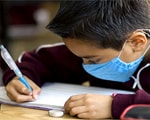The school closures during the emergence of the H1N1 swine flu needn't be done, according to new guidelines issued by American health officials.

However, the same guidelines noted that everything could change if the outbreak suddenly turned severe. New guidelines for schools from the Centers for Disease Control (CDC) and Prevention will help schools prepare and respond to the H1N1 flu, and schools must have clear guidance about how to minimise the spread of H1N1 flu.
In essence, the recommendations balance the need to contain the spread of the novel A H1N1 flu against the disruption of education and inconvenience to parents that school closures can bring.
Following are the recommendations:
- Students and school staff should exercise good flu hygiene, such as hand washing and covering noses and mouths with tissue when sneezing or coughing (use a shirt sleeve if tissue is unavailable).
- If flu is suspected, the affected person should contact a health-care worker as soon as possible. People at high risk (due to pregnancy, or medical conditions such as asthma or diabetes) should take antiviral medication as advised to reduce risk of prolonged or dangerous illness.
- Schools should have an action plan for flu outbreaks, including a room set aside for people suspected of having flu, as they wait to be transported home. Schools should also have a contingency plan if important personnel, such as school nurses, fall ill.
- The CDC recommends the use of surgical masks for ill students or staff and those caring for them.
- The education of students who are ill at home with the flu should be continued, using phone calls, homework packets and web-based learning.
- Any ill student or staff member should stay home for an additional 24 hours after flu symptoms such as fever have ended, even if they are using antiviral drugs such as Tamiflu.
- Select schools with high populations of high-risk students (for example, schools for medically fragile students) may consider closure.
- Parents should check their children each morning for flu symptoms and keep them home if they have fever. Students should also be screened for flu symptoms upon arrival at school.
- If any family member of a student becomes ill with the flu, the respective student should stay at home for five days from the day symptoms arise.
- Increase the distance between students by spreading desks further apart or cancelling classes that bring students from different classes together.
- Extend the stay-at-home period for sick students to seven days, even after symptoms have subsided.
- Close schools after careful weighing of the risks and benefits to students and the community. Schools should be closed for five to seven calendar days, and then officials should reassess the advisability of re-opening the school.
- Even during a school closure, teachers and staff should have access to the school so they can continue to provide instruction via the web and other means.
DoctorNDTV is the one stop site for all your health needs providing the most credible health information, health news and tips with expert advice on healthy living, diet plans, informative videos etc. You can get the most relevant and accurate info you need about health problems like diabetes, cancer, pregnancy, HIV and AIDS, weight loss and many other lifestyle diseases. We have a panel of over 350 experts who help us develop content by giving their valuable inputs and bringing to us the latest in the world of healthcare.












